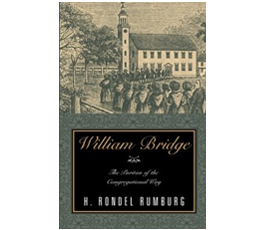Categories
Categories
William Bridge: The Puritan of the Congregational Way-Preface
Posted by on

The quest for a biography of William Bridge first began after this author purchased the first two volumes of The Works of William Bridge, printed in 1649 in London. Under the title, on the title page, was the description, “Sometime Fellow of Emanuel College in Cambridge; now Preacher of the Word of God at Yarmouth.” These volumes were printed twenty-one years before the death of this great Congregational Puritan preacher. Upon beginning the search for biographical material a startling discovery was made. There were only a few pages in any one place on the life of this illustrious stalwart of Christ. Thus the search began in an attempt to fill in as many gaps in his life as could be supplied from the meager sources. The Memoir, in the 1845 five volume edition of The Works of the Rev. William Bridge, M.A., described the biographical problem those publishers faced,
Materials for a lengthened Memoir of William Bridge do not exist, and it is scarcely worth while for the sake of diffuseness, to enlarge upon the circumstances of the times in which he lived: although he undoubtedly occupied a prominent place in the controversies which then agitated the church and the kingdom, and by his writings on the subject of resistance to the higher powers, probably influenced considerably the minds of men at that important period.
The publishers of the Memoir in 1845 pointed to two major problems, as they saw them, for including so little biographical material. One problem was that material was so scattered, and the other problem was political fear, which was the result of the life and writings of this Christian minister. He had stood on Biblical principles regardless of their acceptable nature to other men, and had advanced his views of government for he was convinced they were based on Divine Revelation. Perhaps that was the reason for the statement by those publishers explaining why there were few materials for a longer memoir. They said such materials “do not exist.” However, one must wonder why “it is scarcely worth while for the sake of diffuseness.” “Diffuseness” could refer to the briefness of the materials, which were broadly scattered.
There should be no condemnation of a man who faithfully and biblically followed the Lord in season and out of season. “The circumstances of the times in which he lived” were a part of the world in which God had placed William Bridge. He was undoubtedly one who occupied a prominent place in the controversies of the day, and these controversies were disruptive to the status quo of the established church and the state. However, such a brave man should not be left buried in obscurity. Neither should others heap shame upon him. John Owen, the great Puritan theologian, highly respected Bridge and relished his advice. They worked together on various projects.
William Bridge’s opening remarks “To The Reader” in volume one of the 1649 edition of his Works gave a glimpse of the kind of person he was, as a man of faith, in real life. “So good is the God of Jacob to His Israel on this side the Promised Land, that no good thing will He withhold from them that walk uprightly.” He began with the goodness of God to His people “on this side the Promised Land.” He was speaking from experience. This remark from life shows a realistic Christian view of life. Bridge was convinced that God would not withhold any “good thing” from those who walk “uprightly” or according to God’s will. This shows the healthy view of the Christian faith which he held as the preacher of the Word of God at Yarmouth. He would leave this church only to return at the end of his ministry.
It is the hope of this author that some progress has been made in giving to the public a larger picture of William Bridge. Thanks are extended to the following friends who helped proof the manuscript. Barbara, my wife, is always the first reader of my projects. Also, Phil Beverly, Curtis Stepp and Pastor Harold Taylor were faithful and astute readers. Pastor Carl Russell always brings his scholarship to bear upon any project he undertakes. Pastor Kenneth Studdard also gave aid in looking for books which would assist the author. A thank you is also extended to Dr. E. Leedham-Green and Janet Morris who labor in the Archives at Cambridge University Library for valued help. A hardy thanks, “you all”!
________________________________________________________
H. Rondel Rumburg was born in Princeton, West Virginia. He attended Concord College, Piedmont Baptist College, Luther Rice Seminary, New Orleans Baptist Theological Seminary, and Reformed Theological Seminary where he received his BRE, Th.M., and D.Min. degrees.
Dr. Rumburg has been in the gospel ministry since 1964. He is the founding pastor of two local Baptist churches. He has taught in two Bibles institutes, contributed weekly articles to newspapers, written literature, been a conference speaker, and has authored four books.
Dr. Rumburg is the president of the Society for Biblical and Southern Studies, is an active member of the Sons of Confederate Veterans, and was on the board of directors of the Shelby County Historical Society in Columbiana, Alabama.
Used with permission.
 Loading... Please wait...
Loading... Please wait... 